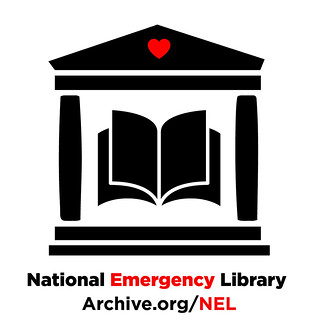
PREV ARTICLE
NEXT ARTICLE
FULL ISSUE
PREV FULL ISSUE
NATIONAL EMERGENCY LIBRARY ANNOUNCEDThe Internet Archive has announced the temporary opening of the "National Emergency Library", an online resource for access to books owned by institutions participating in IA's Open Library program. Here's an excerpt from the press release - see the complete version online. -Editor
During the waitlist suspension, users will be able to borrow books from the National Emergency Library without joining a waitlist, ensuring that students will have access to assigned readings and library materials that the Internet Archive has digitized for the remainder of the US academic calendar, and that people who cannot physically access their local libraries because of closure or self-quarantine can continue to read and thrive during this time of crisis, keeping themselves and others safe. This library brings together all the books from Phillips Academy Andover and Marygrove College, and much of Trent University's collections, along with over a million other books donated from other libraries to readers worldwide that are locked out of their libraries. This is a response to the scores of inquiries from educators about the capacity of our lending system and the scale needed to meet classroom demands because of the closures. Working with librarians in Boston area, led by Tom Blake of Boston Public Library, who gathered course reserves and reading lists from college and school libraries, we determined which of those books the Internet Archive had already digitized. Through that work we quickly realized that our lending library wasn't going to scale to meet the needs of a global community of displaced learners. To make a real difference for the nation and the world, we would have to take a bigger step. "The library system, because of our national emergency, is coming to aid those that are forced to learn at home, " said Brewster Kahle, Digital Librarian of the Internet Archive. "This was our dream for the original Internet coming to life: the Library at everyone's fingertips." Public support for this emergency measure has come from over 100 individuals, libraries and universities across the world, including the Massachusetts Institute of Technology (MIT). "Ubiquitous access to open digital content has long been an important goal for MIT and MIT Libraries. Learning and research depend on it," said Chris Bourg, Director of MIT Libraries. "In a global pandemic, robust digital lending options are key to a library's ability to care for staff and the community, by allowing all of us to work remotely and maintain the recommended social distancing." We understand that we're not going to be able to meet everyone's needs; our collection, at 1.4 million modern books, is a fraction of the size of a large metropolitan library system or a great academic library. The books that we've digitized have been acquired with a focus on materials published during the 20th century, the vast majority of which do not have a commercially available ebook. This means that while readers and students are able to access latest best sellers and popular titles through services like OverDrive and Hoopla, they don't have access to the books that only exist in paper, sitting inaccessible on their library shelves. That's where our collection fits in—we offer digital access to books, many of which are otherwise unavailable to the public while our schools and libraries are closed. To read the complete press release, see:
To visit the National Emergency Library, see:
Here's an excerpt from a National Public Radio (NPR) article on the topic. -Editor Last week, when the Internet Archive announced its "National Emergency Library," expanding access to more than a million digitized works, the group explained the move as a goodwill gesture in the time of coronavirus. With so many brick-and-mortar libraries forced to close their doors, in other words, the group was opening up its lending program: Now, instead of its usual policy of just one digital copy per reader for a 14-day period, many frustrated readers could borrow copies of the same book during the same time — and could do so through the end of June or the end of the global pandemic, whichever came sooner. But there's one major issue that several media outlets, including NPR, failed to mention in covering the decision: Many writers and publishers say the website, even before the creation of this National Emergency Library, has been sharing full digital copies of their books without their permission. And over the weekend, dozens of prominent authors, from Colson Whitehead and Neil Gaiman to Alexander Chee, made clear that they were upset with the Internet Archive's model — and doubly so now, with the expansion of lending services and its timing. The guild said that last year alone it sent the organization hundreds of takedown notices on behalf of the writers it represents, citing the Digital Millennium Copyright Act. The 1998 law lays a framework for preventing users from creating digital copies of copyrighted material and circulating it without the copyright holder's permission. The Internet Archive pushed back against this characterization with a lengthy rebuttal published online Monday. Kahle said the group uses the same controls limiting access to these works as the publishers themselves, with encrypted files that are meant to disappear from the user's computer after a brief period. The copies the group lends, Kahle said, are owned by the Internet Archive — either through donations, straight-up purchases or collaborations with brick-and-mortar libraries. Typically, Kahle said readers can obtain just one copy of a book at a time through the Internet Archive. He said the difference with the "National Emergency Library," with waitlists now suspended through the end of June, is that those limits have been removed and multiple copies of the same book are now available. To read the complete article, see:
Here are excerpts from the Author's Guild statement. -Editor The Authors Guild is appalled by the Internet Archive's (IA) announcement that it is now making millions of in-copyright books freely available online without restriction on its Open Library site under the guise of a National Emergency Library. IA has no rights whatsoever to these books, much less to give them away indiscriminately without consent of the publisher or author. We are shocked that the Internet Archive would use the Covid-19 epidemic as an excuse to push copyright law further out to the edges, and in doing so, harm authors, many of whom are already struggling. A is using a global crisis to advance a copyright ideology that violates current federal law and hurts most authors. It has misrepresented the nature and legality of the project through a deceptive publicity campaign. Despite giving off the impression that it is expanding access to older and public domain books, a large proportion of the books on Open Library are in fact recent in-copyright books that publishers and authors rely on for critical revenue. Acting as a piracy site—of which there already are too many—the Internet Archive tramples on authors' rights by giving away their books to the world. Last year, the Authors Guild and authors sent hundreds of takedown notices to IA and protested the inclusion of their books in the Open Library program. Now, during this pandemic that has severely disrupted authors' lives and choked the publishing industry, IA once again is undermining authors' ability to make a living and decide who gets access to their copywritten material. To read the complete Author's Guild statement, see:
 Wayne Homren, Editor The Numismatic Bibliomania Society is a non-profit organization promoting numismatic literature. See our web site at coinbooks.org. To submit items for publication in The E-Sylum, write to the Editor at this address: whomren@gmail.com To subscribe go to: https://my.binhost.com/lists/listinfo/esylum All Rights Reserved. NBS Home Page Contact the NBS webmaster 
|
